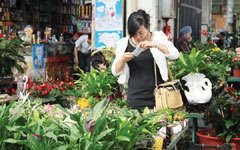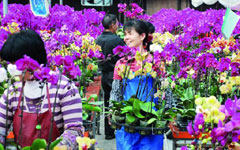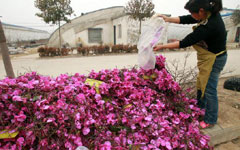Last year, Jinning county produced 2.4 billion fresh flowers on about 2,700 hectares of land for one yield, the Jinning Office of Flowers and Vegetables says. Yet 15 years ago, flower growing was a novelty for most villagers in Kunyang township, in Yunnan province.
It was then that Zhang Liang became a trailblazer. As the first to grow flowers commercially, many of his neighbors were at first skeptical about his prospects.
To learn about flower growing, Zhang, then 19, had read books and spoken to old farmers in other places in the provincial capital, Kunming. Over five years, many local farmers joined him in building greenhouses, and they eventually made a lot of money from it.
 |
 |
 |
After they did so, and as their output increased, finding a stable and safe channel to sell their harvest of each season became problematic. Zhang, the youngest of the growers, tried to drive flowers to a market in Dounan, but they wilted on the 60-km trip, meaning they attracted lower prices.
Things began to change when Zhang met a Singaporean buyer and set up a close partnership with him that became a bridge to Chinese communities in Southeast Asia.
Zhang opened a cooperative operation grouping local growers three years ago to produce flowers harvested from the greenhouses to sell overseas. Last year, 10 million flowers were sold in overseas markets, he says.
All workers in the cooperative are recruited from other towns, and none of the growers' families are allowed to help clean the roses and carnations.
"The families could put poor roses into bundles to make more money, but just one rose could damage my credibility with overseas buyers. Such shortsighted action would destroy the town's reputation."
Now most of his flowers go to Singapore, Thailand, Malaysia and Hong Kong. Many flowers are also sold domestically. Zhang and his customers have built their trust in one another to such a degree that most of their dealings are done on the phone or by text messaging.
Zhang says that during the past decade, more than 230 households in his village have gone into flower growing, selling their flowers to him, and giving each an average income of 140,000 yuan ($22,400) a year.
Zhang offers training to villagers, and the local government gives a helping hand. Wang Yonghui, director of Jinning Office of Flowers and Vegetables, says training programs were offered for flower farmers to help minimize the damage caused by last winter's chill. The Kunming government gave Jinning 7.6 million yuan last year to promote vegetable and flower growing, almost double that of 2012.
"The aim is to expand the flower industry and make our economy stronger," Wang says.
